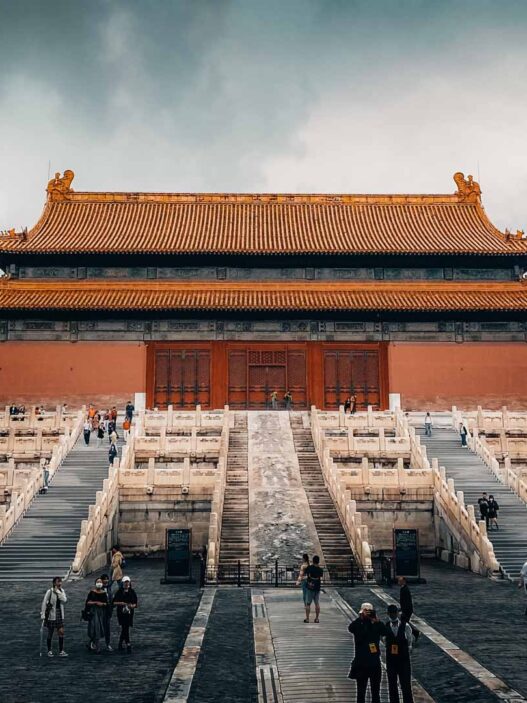Building business relationships in China can be challenging. Traveling through China in over 40 different cities for 3 years and living among the locals has taught me many essential dos and don’ts of establishing business relationships in China.
I worked at two different Chinese companies and met with some of the biggest companies in the entertainment industry. As more and more companies look to expand into the Chinese marketplace, knowing how to build successful business relationships in China is a crucial skill.
So how does doing business work in China? And how do you get great connections? Within this comprehensive guide, you’ll learn about the necessary skills and hidden customs you need for building relationships and business relationships and learn the essentials of how business works in China.
This article will also show similarities and differences in business ethics in China vs. the United States and the rest of the Western world.
The basics of Building Business Relationships in China
First, it’s okay if you need to become more familiar with Chinese business etiquette. You are a foreigner, and they know it. Having you there at the meeting is already very much appreciated.
Simply put, they will value your efforts more if you give them your best. You should accept that, as a foreigner, you will always be treated as such. If you want to be accepted, you’ll have to put in the time and effort required to learn some basic Chinese and get accustomed to Chinese traditions.
Showing Respect
When building effective business relationships in China you need to show respect. You might think, well, that’s obvious. Being respectful is just normal. But! I’ve seen many western people not behaving respectfully. The thing is, some foreigners need to realize they are not behaving respectfully.
For instance, they talk loudly, joke about Chinese traditions, interrupt, etc. Just be polite; that will surely help build relationships in China.
Being Flexible
Be Flexible! Or, like Bruce Lee would say, be like water! Just kidding. But being very flexible helps a lot. Things change fast in China, and so does doing business. I’ve had several occasions where a meeting was canceled at the last time, the boss didn’t show up, or just nobody was there without any notice.
Especially in the club I worked for, the entire company strategy could change in a week! People got fired randomly, and new people got hired the same week, and some people that got fired even got hired back.
This is only the case with some Chinese companies, but the circulation of employees is commonly relatively fast. It can be pretty chaotic. If the boss decides to implement something else, it will happen, and he or she can change his or her mind fast.
Business cards Ethics
Although almost everything is digital in China, business cards are very common and essential for building business relationships in China. Make sure you have some business cards with you!
When business cards are exchanged, it will likely happen at the start of the meeting.
Take the business card on with both hands, observe it for a bit, and thank the person who gave it to you. Then you can give them your business card. Give the card also with both hands to the receiving person.
After doing so, you need to put the business card you received on the table in front of you. Only after the meeting, you can take the business card and put it in your pocket or wallet.
A great extra touch is that you make a unique business card for China. On the back side, you could make a Chinese version. Make sure to have it correctly translated into Chinese.
Make a One-Page PDF
Besides having business cards, I also recommend making a PDF. PDFs are being used to show a quick overview of your project or company. Use photos, big fonts, and charts to show all the details. You can exchange PDFs with WeChat at the end of the meeting.
When building business relationships in China what is important to keep in mind? Here are some of the Dos and Don’ts:
Dos & Don’ts of Doing Business in China
Dos
Be flexible with time, and prepare for last-minute changes.
Respect the hierarchical structure of the Chinese company.
Be polite and patient.
Don’ts
Refrain from clinging too much to your Western ways of doing business.
Don’t rush it!
Take Your Time
Meetings in China can take a long time, like forever, but that’s one of the most essential things. It takes time to build trust.
The fact that you are there, taking your time for them and for their company, is much appreciated. Negotiations can take far longer and require more patience compared to Western countries, where meetings are mostly held if necessary.
Some meetings I attended went on until deep in the night at 3 a.m. Sometimes, after those long meetings, to improve the relationship, a friend and I waited until the meeting was finished, and everyone went home.
Then, when we were the only ones still there the boss would ask us if we’re hungry. Of course, we were hungry, it’s 3 am… ! He told us about this great noodle place, so that’s where we went.
I was thinking, this guy is probably a multi-millionaire, what kind of fancy fine dining noodle restaurant will we go to? Well… we went to the most ghetto/underground/shady noodle place you can imagen. BUT with the best noodles I honestly ever had. And I have had a lot of noodles in those three years I China!
The point is, I was there having a beer with the boss at 4:00 am, building the relationship. Next day, I got a text message saying he had a show for me in a club.
Expressing Ambition
The expression of ambition is different in Chinese meetings compared to meetings in the United States and the Western part of the world.
What I mean by that is that in China, big and ambitious ideas will often be suggested during meetings. For example, ideas for starting new companies or expanding the business to triple revenue will be mentioned.
This differs from the United States and other Western parts of the world, where ideas during meetings are more modest and practical.
So don’t be surprised if someone in the meeting says they want to buy a company and make millions of dollars out of the blue. It’s a way to show the determination and drive to expand the business, which is a good sign for the meeting.
The big boss (Lao ban)
Refrain from assuming that you will meet a man as the boss of a business or company. Women in China are often in charge of companies, much more than in many other countries.
It’s not so much a masculine culture like in the Middle East, for example. Chinese women are very influential and powerful. It’s another one of those things that I love about China.
Companies in China are very hierarchical and structured. There can be level 3, 2, and 1 bosses for example. In most Chinese companies, employees respect the boss, and whatever the boss says will happen.
Other people around
This may only be the case at some meetings in China; If you have an appointment with a board of directors, the meeting will likely be only with them. If it’s a looser, low-key meeting, more people will likely be around than you expected.
Don’t be shocked if other people in the same room are hanging there, playing games on their phones, or eating noodles. This is very common.
I even had a meeting once, and someone was sleeping on the couch, so we talked quietly. Can you imagine walking into a room for a meeting in your country, and someone is sleeping on the couch?
This is something that I love so much about China. It doesn’t matter that someone is sleeping there. Apparently, he needed it, so we’ll talk a bit less loudly. Amazing right!
Chinese Food and Drinking traditions
Big dinners are an important part of the Chinese culture.
Dinner meetings
Sometimes a meeting could be during dinner. If so, the Chinese host might wait until you sit down. So don’t wait and stand there too long in the room; you can take a seat.
The most common sitting arrangement will be that the most important host will sit in the chair right across the door so he or she can see anyone coming in. You, as the guest of honor, can sit next to that person.
Still, many times there is an informal seating arrangement.
Drinking
A common perception, or perhaps more like a stereotype, is that to build business relationships in China, you have to drink alcohol. From my own experience, this is a very old and outdated impression.
It used to be true, during many meetings, more like dinner meetings, there was a lot of alcohol involved. Everyone would drink “BaiJiu” 白酒, meaning white alcohol, a rice liquor. That, my friend, is some powerful stuff! It’s served in tiny cups, about the size of a thimble.
But in recent years, I’ve been told, some cases have led to severe injuries. This is why the government started to promote not drinking during meetings. And very quickly, how many things go in China, the tradition was ended. There is still alcohol involved during dinners, but nowadays, it is entirely voluntary.
If you would prefer not to drink alcohol, just say so, and you will be given a bottle of water instead.
Hidden Chinese Tea Traditions
During many, if not all, Chinese meetings, tea will be served as a gesture of hospitality and respect. This is a fascinating tradition with some unique manners and customs!
Learning these traditions will help to build business relationships in China.
Cleaning cups
An essential part of the tea ceremony is the cleaning of the cups. The host will clean the cups several times with boiling water and throw the water through the roster on the table. The tea itself will also be flushed and cleaned. When that is finished, the cups will be poured.
Cup 75% full
The main task of the host, who is serving the tea, is to keep all cups at around 75% full during the entire meeting. The cups are very small, so two sips are enough to empty your cup. The host will need to refill it. It’s an ongoing process during the entire meeting.
Cup empty
This is considered impolite of the host. If your cup is empty too long, it is impolite. Either the business meeting could be better, or the host needs to pay attention to you.
Cup too full
If the host pours in your glass until it is completely full, when it reaches the edge of the cup, the meeting is over. You can stop drinking, and the host will wrap up the appointment.
Tapping Fingers
This is one of those hidden customs that you will only read here. It’s a tradition about showing respect to your host. It’s a very delightful practice. It’s not a well-known tradition abroad, but it is common during meetings and get-togethers ion China. The host will surely appreciate it if you do this.
You need to tap with your fingers on the table precisely while the host is pouring in your glass.
How many fingers all depends on how the relationship is between you and the host.
Five fingers
If the host is much older, richer, or more important to you, you must tap with all your fingers on the table while the host is pouring your glass. This is the most formal and respectful way of doing it.
Two fingers
If the host is a little older or more important, more equal to you, but you still want to be polite, tap with two fingers on the table. Or if you have met the person a few times already, you may tap with two fingers.
One finger
If the host is your good friend and you are equal, tap with only one finger on the table.
I love this custom. It is a unique, simple, and charming way of showing respect. I wish this would be applied in my home country as well. I did it a few times while drinking tea at my parent’s house, but it didn’t catch on… ah, well.
Things like this will surely be appreciated and show them that you’re not there just to make some money but are really invested in building relationships in China.
Learn the ethics for toasting a glass
If the meeting was a success, you might go out drinking downtown. Prepare for an epic night because clubs in China are absolutely mind-blowing. Clubs in China are next level.
Whenever you are toasting with someone older or ‘more important’, let’s say, the big boss of the company that you are drinking with, this is the rule:
- To show respect when toasting in China: Keep your glass lower than his or her glass when touching each other’s glasses. Their glass should be a bit higher than yours.
- If he or she is also lowering their glass, you lower it even more up to a point it’s okay to just toast because you both have shown respect.
- Toasting in a group, toast lower than the group. It all depends on your level of importance but when everybody toasts together it’s less strict.
Do this, and they will appreciate you knowing about this custom, you’re interested in their culture, and also showing respect. This can help when you’re interested in building business relationships in China.
Guanxi
This is something, perhaps the most important thing that I’ve learned. Relationships. They have a certain word for it in China which is ‘Guanxi’ (关系). It’s best explained as the social network of someone that supports personal and business relationships.
If you have high guanxi, it means that you know a lot of important people. This can be significant leverage in doing business in China. Let’s say you know some other business or government folks from your country that might interest them; make sure you mention it!
Someone can have a high level of Guanxi, which means he or she has a lot of good and important contacts. For me, because I came from The Netherlands, being a Dutch DJ, working at a Club, in their view I had a good amount of Guanxi. The boss recognized this, so obviously we got a long very well.
Guanxi gifts
Sometimes to strengthen the relationship, presents are given. This can be something small from your hometown or country or some thing crazy, like Louis Vuitton earrings.
Giving a small gift can be helpful to keep the relationship warm. If you want to make an excellent first impression, bring something from your hometown. Local food, cookies, drinks, or even candy. They will surely love it.
Exchange WeChat
If the meeting went well, it is polite to exchange WeChat. WeChat is the most used app in China. Everybody uses it for everything: chatting, paying everywhere, buying tickets, social media, etc. Just pull out your phone and say, “Wei Xin?” Which is Chinese for WeChat.
Final thoughts on building Business Relationships in China
Traveling through China gave me many unique insights into Chinese cultures, traditions, and relationships. It opened my eyes to many cultural similarities and differences compared to the Western part of the world, which is beautiful to experience.
Building effective business relationships in China is challenging but very much worth it if you want to expand your business long-term and improve your business opportunities in China. Especially Shanghai is a fantastic place for business.
As a foreigner, the best thing to do is to be flexible, go with the flow, and be open to cultural customs. Oh, and learn some Chinese! Jiayou! 加油

Tip: A great app to get you started is “Chineasy,” where you can learn some background information and the basics with images that fit the Chinese characters.














